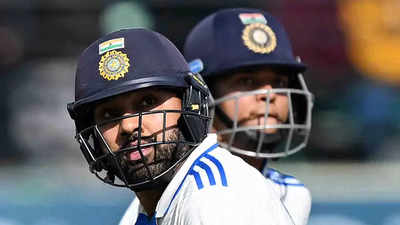NEW DELHI: In the 2015-16 football season, a storm of unexpected events swept across England, rocking the entire world. At its heart was a team that had barely secured the Premier League promotion just a season earlier. Leicester City, a squad set up with low-profile names like Jamie Vardy, Riyad Mahrez, N’Golo Kanté, and their stoic captain Wes Morgan, was the epicentre.
Poll
What is Albino Gomes’ most memorable achievement in his career?
Operating on a shoestring budget in a cash-rich league, the Claudio Ranieri-led side lost only thrice in a 38-match season before lifting their maiden Premier League title, the top division of English football. With Leicester’s name forever etched in history, Ranieri became the architect of this fairy tale that many once deemed unthinkable.
Fast-forward a year, and halfway across the globe in India, chatters of a similar miracle were being heard. Much like Leicester, Aizawl FC — a club crowned champions of the I-League 2nd Division just a year earlier — were considered merely bystanders in the title race in India’s top division ahead of the 2016/17 season.
Go Beyond The Boundary with our YouTube channel. SUBSCRIBE NOW!
Under the guidance of a baby-faced Khalid Jamil, however, they shattered all expectations, losing only three games en route to lifting their historic maiden I-League title.
“Winning the league in 2017 with Aizawl was the most memorable moment. We were an underrated team back then, so achieving that was truly special,” goalkeeper Albino Gomes, who played an integral part in Aizwal’s success that season, told TimesofIndia.com during an exclusive interaction.
For Albino, however, one specific moment stood out above all: the penalty save that defined Aizawl’s 1-1 draw against Bengaluru FC in a title race that saw Aizawl finishing top with 37 points and Mohun Bagan runners-up with 36.
“I saved a penalty from Sunil Chhetri in that match. If he had scored that penalty, we would have lost crucial points, and that might have cost us the league title,” recalled Albino, who was awarded the Hero of the Match accolade that day for his game-changing save in the 55th minute.
An accidental goalkeeper?
Now plying his trade for Indian Super League (ISL) club Jamshedpur FC, Albino Gomes initially never envisioned himself as a goalkeeper.
“I actually went for the striker position in the school team,” Gomes admitted with a chuckle. “I was desperate to make it onto the team, but there were so many senior players ahead of me that I didn’t stand a chance as a striker. Then I noticed something — no one had taken up the goalkeeping spot. My coach stepped in, noticing that I was quite tall for my age, and suggested I give it a try. It felt like my only way to get on the pitch, so I decided to go for it. That’s how I started goalkeeping for my school team.”
Reflecting on those formative years, Gomes is quick to acknowledge the impact of his school’s physical education teacher, Milind Sir, and a coach named Jerome on his journey as a goalkeeper.
“In our school team, we had this one summer camp where they brought in a special coach from Bombay,” he recalled. “His name was Jerome, and he was Goan, he taught me the basics of goalkeeping. He helped mould me into a goalkeeper.”
Albino Gomes: From the Goan roots
The footballing culture in Goa is rich and vibrant. Yet, during the months of December and January, around the time of New Year, Goa comes across as a different place.
Amid the hustle of tourists roaming around to embrace the courteous charm in the air, the deep roots of its historic association with football may not always come to mind.
Yet, Goa remains a state that has played 14 times in the final of the prestigious Santosh Trophy and lifted the title five times, not a bad number — given that they are the smallest state in India by area, covering 3,702 square kilometres of the nation’s land.
There are hundreds and thousands of stories across social media, stories of heroes rising from the sand and mud fields of Goa, as it resembles a machine still capable of producing prodigies of high calibre.
“So basically, like every Goan, I played football when I was young. We played on the streets, in the mud grounds, on the sand grounds — everywhere,” Albino Gomes reflected on his early days. “From there, I started liking football, playing with my friends. Then, I joined the school team, and from there, I gained more interest in playing football. That’s when I started taking it seriously,” he said.
It wasn’t long before his talent was recognised.
“After my school team, I joined Salgaocar FC. They picked me while I was playing for my school team. I spent around five to six years at the Salgaocar Academy. Many coaches there helped me, promoted me to the senior team, and gave me confidence. Training with the senior team and their goalkeeping coach helped me gain a lot of experience.”
Despite Albino describing his journey as “amazing”, it sometimes defies normalcy that he never got to play an official match for Salgaocar.
“I didn’t play an official match for a while, but I got my chance to debut directly in the ISL. That’s where my journey really took off,” Albino told TimesofIndia.com.
Goalkeeping as an art
In recent years, there has been a growing emphasis on goalkeepers not only stopping shots but also taking on the role of sweeper-keepers, playing from the back and distributing the ball with short passes.
Opening up on the evolution of the sweeper-keeper culture in India, Albino opined, “Many Spanish coaches have come to India, and they demand goalkeepers play with their feet and take on the role of a sweeper-keeper. This includes making decisions like passing the ball from one side to the other. If goalkeepers train and build confidence in this style during sessions, it can greatly benefit the team.”
He continued to explain how the approach to training largely depends on the coach’s preferences: “It all depends on the coach. Each coach has their own preferences. If they want a goalkeeper to play as a sweeper-keeper, they modify the training sessions accordingly. This helps the goalkeeper get comfortable with the team, know where the players are positioned, and improve passing accuracy. It’s all about what the coach demands and how the keeper adapts to it.”
Interestingly, Gomes holds the record for saving the most number of penalties (4) in an ISL season. “I focus entirely on the ball. Luck favours me too, I guess. My strength is waiting for the kicker to make their move before committing to a dive, whereas some keepers move before the ball is kicked,” Gomes explained. “My goalkeeping coach and the analysts send me videos, so I study every player who takes penalties to understand their tendencies.”
A national team berth on Albino’s agenda
Reflecting on his time with Kerala Blasters, the club he joined in 2020 and played for over two years, Albino Gomes spoke highly of the passionate fanbase, adding, “I’ve been with Kerala Blaster. The fans there are amazing, and they still support me a lot. So I think that is a plus point.”
“If you want to be a goalkeeper, you have to accept that mistakes will happen. If you make a mistake, you shouldn’t let it bring you down. Instead, you have to acknowledge it, work on improving, and come back the next day with the same mentality and confidence,” Gomes, now an experienced campaigner, shared his mantra. “I look for the mistakes I have made, talk to the coach, and try to correct them during the training sessions.”
When asked about his future ambitions, Gomes expressed a strong desire to represent the national team, noting, “I want to be in the national team because I’ve been there and I know how it feels. I have to get to the senior national team and I am working for that and hopefully, this season goes well. The coach will hopefully notice at the end of the season, let’s see how it goes.”
ALSO READ: Exclusive | Father played with Joe Root’s dad, son to partner Virat Kohli: Jacob Bethell’s rise to RCB’s Rs 2.6 crore star











